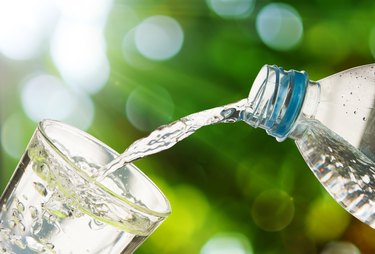
Water and electrolytes are needed for the body to work properly. These substances help maintain the balance of the blood and other fluids present in tissues and cells. If your fluid or electrolyte levels fall too low, you will need to replenish them. You can do this with oral solutions or intravenous solutions.
Indications
Video of the Day
Typically, fluid replacement is needed if you become dehydrated. Dehydration may occur if you do not drink enough fluids. It can also result from a sudden loss of fluids and electrolytes in your body, such as with severe diarrhea or vomiting. Other reasons you may need your fluids and electrolytes replaced include a high fever or excessive sweating.
Video of the Day
Oral Rehydration
Because of the convenience and relative safety, oral rehydration therapy is preferred in most cases of mild or moderate dehydration. According to the Merck Manual, mild dehydration can be corrected by drinking approximately 23 mL of fluid for every pound of body weight over the course of four hours. For the treatment of moderate dehydration, the fluid replacement increases to 46 mL of fluid for every pound of body weight. After four hours have passed, the patient can be reassessed and additional fluids may be given if necessary. Oral rehydration does not require special equipment and is adequate for most cases of fluid and electrolyte loss.
Intravenous Rehydration
Intravenous replacement of fluids and electrolytes is generally used only in severe cases of dehydration. This route of administration requires sterile specialized equipment and should only be performed in a medical setting or by a trained professional. The main advantage of intravenous fluid replacement is that it works quickly, with the fluids and electrolytes bypassing the digestive tract and going directly into the bloodstream. Intravenous fluid replacement can also be used for patients whose vomiting makes drinking fluids difficult.
Solutions
Oral rehydration solutions should contain 2 percent glucose and 50 to 90 mEq/L of sodium, the Merck Manual advises. In general, it is best to buy an oral rehydration solution, which is obtainable in the U.S. without a prescription. It will usually come as a powder you will mix with tap water, though there are also premixed solutions available. If you make your own solution using sugar and table salt, have someone check your measurements carefully. Errors in preparation can lead to fatal hypernatremia, the Merck Manual cautions. Solutions to be used intravenously should be purchased already mixed because the right proportion of glucose and electrolytes is critical when a fluid goes directly into the bloodstream.
Is this an emergency? If you are experiencing serious medical symptoms, please see the National Library of Medicine’s list of signs you need emergency medical attention or call 911.